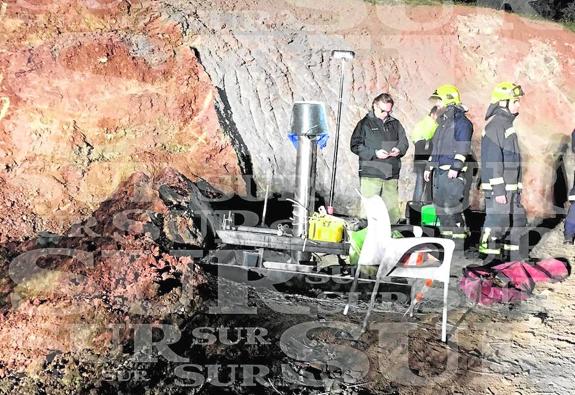Time running out for little Julen as rescuers are still 'days away' from reaching him
The two-year-old boy plunged down a 100-metre-deep borehole in Totalán on Sunday and has been trapped there since
ÁLVARO FRÍAS / EUGENIO CABEZAS / IGNACIO LILLO / JUAN CANO
Lunes, 21 de enero 2019, 10:57
Rescue efforts are continuing night and day in Totalán, near Malaga city, as the nation crosses its fingers in the quickly extinguishing hope that two-year-old Julen, who fell down a 107-metre prospecting shaft on Sunday, can still be rescued alive.
Workers and experts are at the site 24 hours a day and are working on digging a parallel shaft that they hope to connect to the borehole. However, instability of the land, as well as impending rain, mean that it could still be days until they reach the boy.
Julen fell into the hole, which is just 25 centimetres wide, while playing with a friend as his parents prepared lunch in the rural area near the Cerro de la Corona dolmen. A relative witnessed the fall and heard Yulen's cries.
Two hikers heard the desperate screams of the family and went to investigate.
The emergency services were alerted twice almost simultaneously. The first call came from the parents of the boy and the second from the hikers.
The provincial fire brigade, the fire department of Malaga and the police, as well as the mountain rescue team (EREIM) were immediately deployed.
A complicated operation
With a diameter of just 25 centimetres, evidently it is impossible for a person to be lowered into the same hole. The first course of action was for firemen to lower a mobile phone with a camera to check if anything was visible. They reached about 50 metres from the surface with no trace of the boy.
A robot donated by the drain-cleaning firm Pepe Núñez was then lowered into the hole to attempt to get a better idea of the situation. However, despite reaching a greater depth, 78 metres, it was unable to get past earth that had apparently been dislodged as the boy fell. It did, however, locate a bag of sweets and a cup that had been in Julen's possession at 75 metres. DNA samples later confirmed to belong to Julen were also recovered.
Having called in experts from the Colegio de Ingenieros de Caminos, it was then decided that specialist equipment would be used to remove some of the loose ground that fell in. However, after working through the night until Monday morning, only a small quantity had been cleared, of between 30 and 40 centimetres. "It was like trying to clear a mountain with a spoon," said one of the workers on the scene.
Suction equipment was brought in, provided by a company from Cadiz, but when the system broke down, rescuers lost 24 hours as they tried to remove the 90-metre-long machinery. These impeded efforts to shore up the inside of the hole by inserting tubes.
"I sealed the well shut"
-
The hole into which little Julen fell on Sunday had been dug just a month previously by the company Triben Perforaciones.
-
The company's boss, Antonio Sánchez, was involved in the work himself and went to the site in Totalán on Tuesday.
-
"I sealed the well shut with a large stone," he said. "I did it, like I have done so many times before, to make sure that no one could fall in."
-
He insisted that around five tonnes of shale was then placed around it, meaning that it could only have been exposed if someone else had subsequently carried out ground- movement work.
-
Sánchez, who was summoned to the site by the Guardia Civil with a view to helping in the rescue operation, wanted to make it clear that the excavation had been carried out with all the necessary permits and permissions, despite sources from the Junta de Andalucía being unable to confirm if this was true.
Chilean miners
By Tuesday, the amount of workers and specialists at the site had swelled considerably. The most high profile additions to the team were the Stockholm Precision Tools (SPT), known for famously helping in the rescue of the 33 Chilean miners in August 2010.
"They've joined us here voluntarily and they have explained to us how they work," said Julen's father José.
Between the more than 100 experts on site, they all agree: "This is one of the most complicated operations we have come across."
From three options to one
Since the start of the operation, three possible approaches have been under consideration: clear the earth which has trapped Julen, build a parallel shaft (wide enough for a human) then connect the two, or build a connecting perpendicular tunnel. However, the first and last options have since been discarded with the former increasing the risk of further earth falling in and the latter expected to take much too long, given the instability of the terrain.
By Thursday, all efforts concentrated on digging the parallel hole which "in normal circumstances would take a month", according to Juan López Escobar, spokesman for the Colegio de Minas in Malaga.
"To put a timescale on it now would be reckless," he added. "We are working to do it as quickly as possible but we're talking days rather than hours."
The looseness of the ground and the required depth are the principal issues at present. Machinery can only excavate to a depth of 50 metres, so a preliminary excavation must first take place beforehand so that the new shaft will reach the required depth. But after hitting a particularly hard area of slate, rain forecast over the weekend and time passing rapidly, any remaining hope of finding Julen alive is slowly fading.
